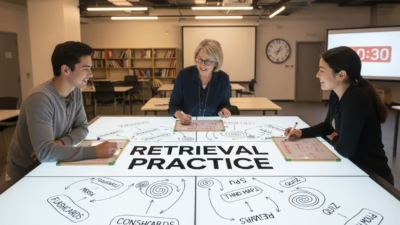Picture this: it’s early morning, and you’re rushing to get ready for school. You glance at your notes from last night’s study session, but the key points slip away like sand through your fingers. That foggy brain can make the whole day feel like an uphill battle.
Sharp memory isn’t just a nice-to-have for students; it’s essential. It helps you ace exams, grasp new concepts in class, and build confidence in your learning. Without it, even the best efforts fall short, leaving you stressed and behind.
The good news? You can sharpen your memory with quick morning routines that take just 10 to 30 minutes. These simple habits kickstart your brain, making recall easier and focus stronger. They’re perfect for busy schedules and backed by science to deliver real results.
We’ll cover five easy routines: starting with hydration to wake up your mind, adding movement for better blood flow, fuelling with smart nutrition, doing mental warm-ups to clear mental clutter, and building consistency for lasting gains. Studies show hydration improves concentration right away, while light exercise boosts cognitive performance without overwhelming your day. A balanced breakfast supports memory retention, and regular mental exercises reduce stress to free up your thinking space. Sticking to these habits regulates your body clock, enhancing overall brain efficiency.
Imagine starting each day with a clearer head and sharper recall. These routines fit seamlessly into your mornings and can transform how you learn. Ready to give your memory the edge it needs? Let’s dive in and make those study sessions count. For more on effective exam study strategies, check out our guide to pair with these habits.
Table of Contents
- Why Morning Routines Boost Student Memory Right from the Start
- Energise Your Body with Quick Morning Movement
- Fuel Your Memory with a Smart Breakfast Choice
- Mental Warm-Ups to Sharpen Focus and Recall
- Build Lasting Habits for Consistent Memory Gains
- Conclusion
Why Morning Routines Boost Student Memory Right from the Start

Your brain spends the night in recovery mode after a full day of learning. Sleep helps sort memories and recharge, but when you wake up, it needs a gentle push to get back online. Morning routines provide that activation, aligning with your body’s natural circadian rhythms to sharpen focus and recall. Research shows these habits improve concentration by boosting blood flow to key brain areas and building stronger neural links over time.
Think about it: without a solid start, poor sleep or a rushed morning can leave you with that heavy fog, making it hard to remember a maths formula or a key date from history class. Simple routines cut through this by reducing stress hormones that cloud your thoughts. They also prevent dips in energy from things like skipped breakfast, keeping your mind steady through lectures and study breaks.
Students see real gains here. Better concentration means you grasp concepts faster, while stronger recall helps during quizzes. Over weeks, these habits pair well with your study schedule, turning short-term facts into long-term knowledge. You build a routine that supports everything from note-taking to exam prep, making school feel less overwhelming.
One study on dehydration and cognition found that rehydration quickly lifts fatigue and aids short-term memory (Effects of Dehydration and Rehydration on Cognitive Performance). Another links hydration to better mood and memory tasks in school-aged kids (Hydration, mood, and cognition in primary school aged children). Start small, and you’ll notice your brain firing on all cylinders.
The Role of Hydration in Clearing Morning Brain Fog

Overnight, your body loses water through breathing and sweat, leaving your brain slightly dehydrated by morning. This dryness slows down signals between neurons, which handle memory and alertness. A quick glass of water rehydrates those cells, speeding up processing so you feel sharper right away.
Grab that water as soon as you wake up. Aim for about 250ml to kickstart the flow. Add a slice of lemon if plain water bores you; it adds a fresh zing without extra calories. This simple step clears the cobwebs, helping you recall lecture points or homework details without straining.
For students, the perks shine in class. Quicker recall means you follow discussions easier and jot down ideas without blanking out. It also fights off that mid-morning slump, keeping your focus steady until lunch. Pair this with good sleep habits to dodge foggy days altogether, and you’ll handle tough subjects like science or literature with more ease.
Energise Your Body with Quick Morning Movement
You know that sluggish feeling when you first roll out of bed? A bit of movement shakes it off fast. Light exercises like stretches, jumping jacks, or a short walk pump blood to your brain and release endorphins, those natural mood lifters. More oxygen reaches your neurons, which sharpens memory retention and clears sleepiness. For students, 10 to 15 minutes before heading to school or uni fits right in. It fights the effects of sitting all day over books and boosts your mood for better learning. If you prefer calm over high energy, try yoga poses instead. These simple moves build focus without tiring you out.
Simple Stretches That Wake Up Your Brain Cells
No gear required, these stretches work in your dorm room or even by your bed. They loosen tight muscles from sleep and target areas linked to brain function, like the neck and shoulders, to improve circulation and alertness.
Start with neck rolls. Gently tilt your head side to side, then forward and back, five times each way. This eases tension around your spine, where nerves connect to the brain, helping signals flow better for quicker recall.
Next, do arm circles. Stand tall, extend your arms out, and make small circles forward for 30 seconds, then backward. They open your chest and boost upper body blood flow, which feeds oxygen to memory centres in the hippocampus.
Try standing forward bend. Bend at the hips, let your arms hang, and hold for 20 seconds. It calms your nervous system and stretches the back, reducing stress that clouds thinking.
For a twist, add seated spinal twist. Sit cross-legged, place one hand on the opposite knee, and turn gently. This stimulates digestion and brain areas for creative thinking. Do each side for 10 seconds. These take under five minutes and leave you ready to tackle notes. Check out these bedside stretches from Harvard Health for more ideas.
A Brisk Walk to Spark Creative Recall
Step outside for a 10-minute brisk walk if the weather allows. Fresh air mixes with movement to strengthen memory links, as oxygen sparks associations between ideas, like tying history facts to real events.
The rhythm helps your brain sort overnight thoughts, making recall sharper in class. Studies back this; even short walks enhance cognition by increasing brain-derived proteins that protect memory cells. If rain keeps you in, pace your room or hallway at a quick clip, or climb stairs for the same boost.
This routine suits low or high energy days, just adjust your speed. It counters long study sits by lifting endorphins, so you feel positive about learning. Once you’re moving, your body craves fuel, so let’s look at how a smart breakfast keeps that energy going.
Fuel Your Memory with a Smart Breakfast Choice
After your quick walk or stretches, your body craves real fuel to keep that brain boost going. Solid foods step in here, where hydration alone falls short. A smart breakfast delivers steady energy through proteins, healthy fats, and vitamins that support neurotransmitters, the chemicals that help your brain store and recall information. Skip sugary cereals; they spike your blood sugar then crash it, leaving you foggy mid-morning. Instead, pick simple, student-friendly options that take little time to prepare. These choices build on your movement routine by nourishing memory cells for clearer thinking in class.
Brain-Boosting Foods to Start Your Day Right
You can grab these affordable items from any shop and whip them up fast. Each one targets brain health in its own way, from protecting cells to enhancing focus. Here’s a rundown of four solid picks to try.
- Berries: Toss a handful of blueberries or strawberries into your meal. Their antioxidants shield brain cells from damage, helping you remember facts like biology terms without effort. Prep tip: Rinse them quick and eat fresh; no cooking needed.
- Oats: Cook a small bowl of porridge in the microwave. The soluble fibre releases energy slowly, stabilising blood sugar to keep your mind sharp. Oats also pack B vitamins that aid neurotransmitter production for better recall during lectures.
- Eggs: Scramble one or two eggs in under five minutes. The protein and choline boost acetylcholine, a key chemical for memory formation. This fights off forgetfulness, so you nail that essay outline.
- Nuts or seeds: Sprinkle almonds or chia seeds on top. Their omega-3 fats reduce inflammation in the brain, supporting long-term memory like historical dates. Grab a small bag; they’re portable for rushed mornings.
For a full 5-minute meal, mix oats with berries and a spoonful of chia seeds, then microwave. Add a boiled egg on the side if you have a kettle. This combo gives balanced nutrients without hassle.
These foods link right to stronger cognition; for instance, leafy greens and similar picks enhance brainpower, as noted in Harvard Health’s guide on foods for better brain function. With your stomach settled, shift to mental warm-ups to prime your thoughts even more.
Mental Warm-Ups to Sharpen Focus and Recall
You’ve fuelled your body with water, movement, and a solid breakfast. Now, give your mind the same kick. Mental warm-ups take just five to ten minutes and prime your brain for the day ahead. They clear out overnight clutter, spark neural pathways, and make recalling facts feel effortless. For students, this means sharper essay outlines or quicker answers in exams. Think of it as oiling the gears before a big race; your thoughts flow smoother, and stress fades. These habits build over time, turning into tools for lifelong learning without adding hours to your schedule.
Breathe Easy: Meditation for Clearer Thinking
Anxiety often muddles your memory right when you need it most. A short meditation cuts through that fog by calming your mind and boosting focus. It lowers stress hormones, so yesterday’s notes stick better instead of slipping away.
Try this simple five-minute routine to start. Sit comfortably on your bed or chair, close your eyes, and place one hand on your belly. Breathe in slowly through your nose for four counts, feeling your stomach rise. Hold for four counts, then exhale through your mouth for four. Repeat this box breathing ten times. If thoughts wander, gently pull them back to your breath.
This practice sharpens attention and aids working memory, as one study on teens shows daily sessions improve recognition after just weeks. You’ll notice clearer thinking in class, with less distraction during lectures. For more on how meditation helps students stay sharp, see this guide on morning benefits for kids and teens.
Quick Review Tricks to Lock in Yesterday’s Lessons
Don’t dive into heavy study; a quick scan reinforces what you learned without overload. Active recall pulls info from your brain, strengthening those memory traces like flexing a muscle.
Grab your notes or flashcards for two to three minutes. Cover the answers and quiz yourself: what were the main points from history? Jot down what you remember, then check for gaps. Focus on three to five key ideas, not everything.
This method beats passive reading by making connections active. For example, summarise a science formula in your own words to lock it in. Students use it to prep for tests, turning fuzzy recall into confident answers. Check out these practical active recall tips for studying to refine your approach. Over days, it builds recall speed for exams and essays.
Build Lasting Habits for Consistent Memory Gains
You’ve got the tools now: hydration clears your fog, movement wakes your body, breakfast fuels your focus, and mental warm-ups prime your mind. The real magic happens when you turn these into daily habits. Stick with them, and you’ll see steady memory improvements that make schoolwork feel easier. Set a fixed wake-up time, say 7am, to match your body’s clock. This consistency helps your brain expect the routine, boosting recall over time.
Plan a simple sequence: drink water first, then stretch or walk, eat your meal, and end with breathing or review. Keep it under 30 minutes so it fits your mornings without stress. Late nights can throw this off, but use a gentle alarm that mimics sunrise light to ease into it. Tell a roommate or family member about your plan for accountability; they can nudge you if you slip.
Face challenges head-on. If tiredness hits from cramming, shift bedtime earlier by 15 minutes each night until you hit eight hours of sleep. Track your progress in a journal: note how sharp you feel after a week. Celebrate small wins, like remembering a formula without notes. These build motivation and show your efforts pay off.
For extra support, explore how music can enhance students’ study habits to add tunes that reinforce your routines. Research from Harvard backs this approach; healthy habits like these strengthen memory by supporting brain health daily. Mayo Clinic adds that staying organised and active ties it all together for better recall.
In the end, these habits lead to bigger student wins: higher grades, less stress, and confidence in your learning. Your mornings set the tone for success, so start today and watch your memory thrive.
Conclusion
These quick morning routines pack a real punch for students looking to sharpen their memory. Hydration clears that early fog and gets your brain signals firing fast. A bit of movement, like stretches or a brisk walk, pumps oxygen to your neurons for better recall. A smart breakfast with berries, oats, eggs, or nuts fuels steady energy and supports those key brain chemicals. Mental warm-ups, through breathing or a quick review, prime your focus and lock in yesterday’s lessons. When you build these into daily habits, they work together to transform foggy starts into clear, confident days.
Together, they create a powerful chain that boosts concentration, reduces stress, and turns short-term facts into lasting knowledge. You handle classes with ease, nail quizzes without panic, and feel ready for any challenge. Stick with them, and your mornings become the foundation for stronger learning all day long.
Pick one routine to try this week, say starting with a glass of water or a five-minute stretch. See how it feels, then add another. Small steps lead to big changes, and soon you’ll notice your memory working sharper than ever.
Share your experiences in the comments below, what routine clicked for you? Subscribe for more tips on study habits that make school simpler. Consistent mornings build confident learners, so get started and own your day.




